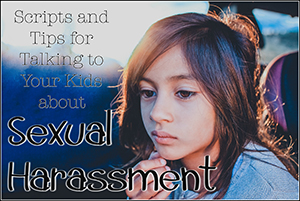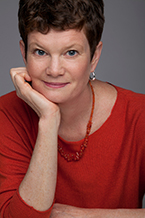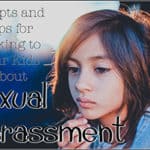From Childhood Sexuality Expert, Amy Lang, MA
 With all that’s in the news lately about sexual harassment, we know it’s a tricky topic for a lot of parents to discuss
With all that’s in the news lately about sexual harassment, we know it’s a tricky topic for a lot of parents to discuss
with their kids. To help you with the scripts and tips, we’ve asked our favorite Childhood Sexuality Expert, Amy
Lang, to share her wisdom…
Suddenly the news is full of stories about sexual harassment and your kids may hear this phrase regularly over the next several
months. Even if you have been very careful about your child’s media exposure, not every parent is, and kids may talk
to each other – especially about something with the word “sex” in it.
Is it possible to talk to a child about sexual harassment when they may not even know about sex? Sure. However, the longer
you avoid the topic of sex in general, the higher the likelihood your child will hit up the internet for information.
You are your child’s best teacher on this topic. Think about it…if kids don’t know what sexual harassment means, how will
they know when it happens to them or,
if they sexually harass someone else?
I’m certain you don’t want your child to be on either side of this situation – to be the harassed or the harasser. The solution
is to talk about it now so they can be safe and make good decisions about their interactions with future friends and
co-workers.
Here are some tips for talking to your school-age kids about sexual harassment:
- No matter what, you need to
stay calm as you have this conversation! If you freak out, they may think there is something wrong with
them (and you) and their trust in you will be reduced. - Ask them if they’ve heard the words “sexual harassment.” If they say yes, ask them what they think it means. Be ready
for their response because they may know way more than you ever imagined. - Regardless of what they say (even if they are spot on), you need to explain it to them so they learn two things:
- You are open and willing to talking about uncomfortable topics
- Your values about how people should treat each other
- Use bullying as entry into the conversation. Most kids understand bullying – what it is, why people do it and what to
do if it happens to them or their friend. - Use this script or create your own version of it:
Sexual harassment is like bullying. It’s when one person makes comments to someone about their body, how they look, their
clothes or their private parts. These comments make the other person feel yucky, embarrassed, scared or mad.
Sometimes the sexual harasser will touch the other person when they do not agree to be touched.
It happens most often (but not always) to women and girls, and men are usually the people who do this. It is not
okay or right and the person who sexually harasses someone knows it is not okay.
They do it because often they are in a position of power over the other person, like their boss, and it makes them feel even
more powerful.
In our family, the rule is that if someone does something like this – or anything that makes you feel uncomfortable
– you tell me and you will not be in trouble.
If you make a mistake and do something like this to someone, same rule, you let me know and you won’t be in trouble.
Regardless, I’ll make sure you are okay and get help if you or the other person needs it.
Read this out loud a few times so you get the feel of the words in your mouth Put your own spin on it
and sound like a pro when you talk to your kids.
Never be afraid to tell your children you are uncomfortable talking about something. It will explain your
starts and stops and is wonderful modeling.
Even though you may worry that your children will be scared by this conversation, it’s much scarier for them to
not know what this means and to try to figure it out by themselves. They know it’s something bad, but when they
have no context or explanation from a safe adult, it can be much worse for them.
When you talk openly with your kids about tough topics like this one, especially at an early age, it paves the way for
more complex conversations as they get older. And even though it probably doesn’t seem like the most fun ever, the
pay-off is huge: healthy and happy kids who grow up to be healthy, happy and whole adults.
Need a deeper-dive into the sex talks? Take a peek at Amy Lang’s online course for parents here.
https://www.birdsandbeescourse.com
About the Author

A sexual health educator for over 20 years, Amy Lang, MA teaches parents and caregivers of all beliefs how to talk to
their kids about the birds and the bees. She is the author of the award winning book
Birds + Bees + YOUR Kids – A Guide to Sharing Your Beliefs About Sexuality, Love, and Relationships and
Dating Smarts: What Every Teen Needs to Know to Date, Relate or Wait. Amy is still married to her first husband
and they are getting the hang of parenting their teenage son. She lives in Seattle, WA. Learn more at
BirdsAndBeesAndKids.com.
fbq('init', '242339395966190'); fbq('track', "PageView");

